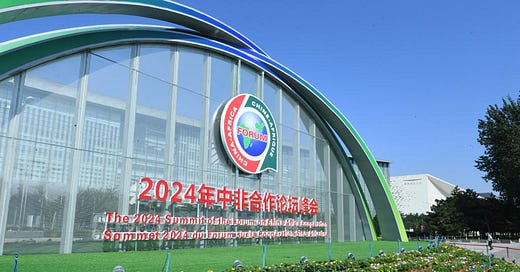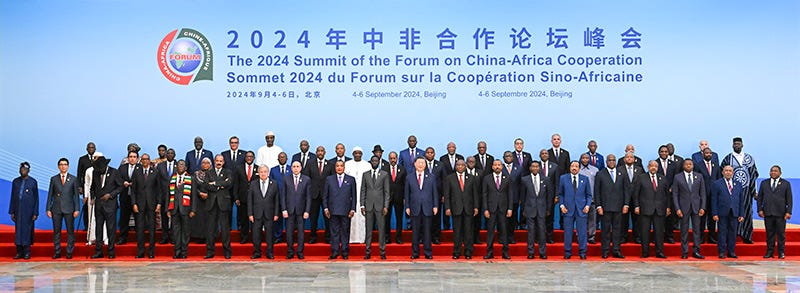The 2024 Forum On China-Africa Co-Operation (FOCAC) concluded on 6th September in Beijing and saw the majority of Africa’s leaders meet with Chinese leadership to discuss the partnership between China and the African continent. Such a large meeting of Global South leaders has, of course, reignited the discourse (at least in the West) around the true nature of the China-Africa relationship. So, let’s take a look at China’s relationship with Africa by taking a novel approach: actually listening to what Chinese and African politicians are saying.
The Chinese Perspective
President Xi Jinping’s opening address to the 2024 FOCAC summit offers an interesting insight into how China views Africa. The speech is rooted in a historical understanding of the relationship between China and Africa which is, in President Xi’s understanding, anchored by their shared experience of the fight against colonization in the 20th century. As part of this historical framework, President Xi is very critical of the Western model of development, saying that “the Western approach to it [development in the Global South] has inflicted immense sufferings on developing countries.”
Yet, despite being informed by the history of China-Africa relations, the keyword in the speech is modernization, which President Xi defines as having the ultimate goal of “the free and full development of human beings.” This modernization is achieved through a partnership between China and the various nations of the African continent, which President Xi points out together to number 2.8 billion people. The hope is that this critical mass of people can, as President Xi states, “promote modernization of the Global South...and write a new magnificent chapter of development in human history.”
These comments were echoed by other Chinese officials at different events around the FOCAC summit. It was also proposed that bilateral relations between China and all African countries having diplomatic ties with China be elevated to the level of strategic relations, further highlighting the importance of Africa in the Chinese project of modernization.
For China, then, the relationship with Africa is not merely an economic one. China, like many countries in the Global South, views the current, Western-led international order as deeply undemocratic and exploitative. In Africa, China is looking for partners in an ongoing project to reshape the global order to favor the global majority.
The African Perspective
Africa is, of course, not one country, and we cannot turn to a unified political authority to get the “African perspective” like we might with China or the US. However, I think it is still possible to get a sense of how China is perceived on the African continent by turning to the leaders who showed up in Beijing to represent their countries. For example, in his opening statement at the beginning of his state visit, South African President Cyril Ramaphosa made clear that he felt the two countries had many shared objectives and a commitment to “progressive internationalism.” In the joint statement released at the end of the same state visit, Ramaphosa welcomed China’s role on the world stage since he viewed China’s development initiatives as “aimed at improving global peace and security, promoting socio-economic development, and contributing to the reform of global governance.”
As China’s largest trading partner on the continent, South Africa’s continuing enthusiastic partnership with China on a range of issues speaks volumes about the nature of that relationship. However, Ramaphosa was not the only African leader to make positive remarks about China’s role in Africa. Speaking at an embassy event in Beijing, Nigerian President Bola Tinubu told the audience that he would like to see Nigeria copy the Chinese development model. The Zimbabwean President Emmerson Mnangagwa would make similar comments about his own country in an interview with CGTN. Malawian President Lazarus Chakwera told People’s Daily that “China is a great example of a partner that gives you a hand so you're able to achieve your own dreams.” In an interview with CCTV, Kenyan President William Ruto spoke of how China respected the views of other countries and, in a separate speech in Beijing, called on Chinese help in reforming the international financial architecture.
Of course, Africa is a diverse continent, and some Chinese projects certainly have their critics. However, what is clear is that the consensus among African leaders is that China is a valuable partner in development. There may not be agreement on everything, but such is the nature of a relationship between equals: only an imperial power can dictate rather than negotiate.
The Western Perspective
The West, particularly Europe, has hundreds of years of colonial history on the African continent, and they have done little to nothing to come to terms with that. The colonial relationship is also not just one resigned to history. For example, France and Spain continue to govern territory on the African continent. The CFA franc - a currency union dubbed “the last colonial currency” and encompassing 14 countries in West and Central Africa - puts the monetary policy affecting 210 million Africans in the hands of the European Central Bank. Numerous Western countries operate dozens of military bases - called “footprints of colonialism” by the Tricontinental Institute - throughout the continent. I could go on. The point is that we can be sure the West doesn’t care about colonialism or exploitation in Africa because if it did then it would end its own colonial exploitation of the continent.
Why, then, do Western sources continue to pontificate about China’s relationship with Africa? Certainly, it seems that Africans themselves haven’t been taken in by it.
Well, Western reporting about Africa is primarily for a Western audience. Africans know from long and painful experience that the West is not a good faith actor. However, well-meaning Westerners are often unaware of the full extent of the West’s historic and contemporary role in Africa’s problems. The narrative of Chinese colonialism in Africa or “debt trap diplomacy” is intended to further obscure this reality. As such, we have a situation where well-meaning liberals and even self-identifying leftists in the West are upholding Western hegemony because they believe they are “saving” Africa from China. The Western narrative has more to do with maintaining legitimacy at home than explaining the situation abroad.
The Relationship on the Ground
How China’s relationship works on the ground in Africa is a topic I don’t have the word count to cover here, but I would point you to the amazing work of Amanda Yee on the myth of the debt trap HERE or here recent segment on Africa at Breakthrough News HERE. We can also turn to our own Li Jingjing: check out here on-the-ground reporting from Africa HERE or here recent talk with scholar Fadhel Kaboub on neo-colonialism in Africa HERE. Or even watch this Bloomberg piece from a few years ago outlying why there is no evidence of a Chinese debt trap HERE.
China’s relationship with Africa is not a colonial one, nor does China view the countries of Africa as charity cases. As we can see from the FOCAC summit, both Chinese and African leaders see their relationship as a partnership of equals in which all sides respect each other and work towards mutually beneficial modernization and development. This is also a political relationship in which the countries of Africa, China, and other members of the Global South work together to build a fairer international system for the global majority.
This, perhaps, explains the West’s unease: the continuing strengthening of this partnership is not only a growing threat to Western imperial interests in the Global South but is completely at odds with how Westerners view the world. Especially in Europe, centuries of colonialism on the African continent have conditioned European leaders into seeing Africa as either a colonial subject that can be exploited for both human and natural resources or a recipient of the noble charity of a more advanced civilization. Racial assumptions like these prevented the West from seeing in Africa equal partners.
Page Editor: Jin Yulin
Call for Contributors!
I’ve added an “ Op-Ed” section to China Up Close. It’s an open platform I specifically designed to let everyone share their own perspectives with the world. Articles can be related to any topic as long as you’re highly passionate about it! Article length is recommended to be within 700 - 900 words.
If you have an idea for an Op-Ed, contact jjnewsletter@hotmail.com with a brief description of the article's focus.
Jingjing’s Social Media Links
X: @Jingjing_Li YouTube: @Jingjing_Li Facebook: Talk it Out with Li Jingjing
TikTok: @iamlijingjing Reddit: r/NewsWithJingjing Instagram: @jj_ontheroad





